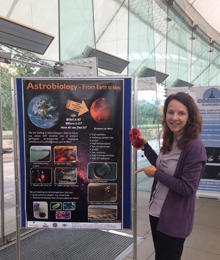An interview with Petra Schwendner
Dr Petra Schwendner is an Astrobiologist at the University of Florida Space Life Sciences Lab, USA. In this interview, she tells us more about her research, including her involvement in examining the Mars500 simulated spaceship to find out more about how populations of microbes change, and why microbiology matters.

Tell us more about your research.
I am an Astrobiologist, currently investigating the effect of simulated Martian atmospheric pressure on microbial growth and metabolism, in the frame of a NASA project at the Space Life Sciences Laboratory adjacent to the Kennedy Space Center in Florida. The world of micro-organisms fascinated me from the beginning, and I was always curious to study their response when exposed to space, simulated space/Martian conditions or extreme environments. Throughout my career, I have worked at a lot of different laboratories with leading astrobiologists, studying questions related to the origin of life and whether there is life elsewhere in the solar system. I have performed a broad range of experiments, including analysing microbes in extreme environments on Earth and samples exposed outside the International Space Station; collected microbes inside a spacecraft associated clean room; on a spacecraft, and in confined environments such as during the Mars500 project.
You were part of a research team that examined the Mars500 simulated spaceship to find out more about how populations of micro-organisms change. Can you tell us more about this project?
Six men participated in the Mars500 isolation experiment, which was a dry run on Earth in a spacecraft mock-up facility in Russia for a future human mission to Mars. With every crewed mission, micro-organisms will undoubtedly tag along and hitchhike to Mars. However, not all micro-organisms are beneficial, and some of them are pathogens with the potential to cause infections. Therefore, we monitored the microbial load, diversity and dynamics over time to guarantee a safe environment during space travel.
Our team obtained a comprehensive insight of the microbiome and was able to identify microbial hot spots within the facility where the number of bacteria was higher than in other areas. Nevertheless, the overall bacterial counts were within the acceptable limits due to appropriate cleaning measures. The study revealed that the microbial community inside the habitat was under control at all times, with little to no risk to the crew.
Why does microbiology matter?
To me, micro-organisms are the real masters of the universe. They are fascinating because they are incredibly resilient, versatile and play essential roles in humans and in the global ecosystem. They can quickly adapt to changes in the environment and are able to colonize some of the most extreme environments on Earth. Being model organisms in astrobiology, they are in the spotlight when searching for extra-terrestrial life, as they are one of the most likely simple lifeforms that could potentially be found on Mars or other planetary bodies.


